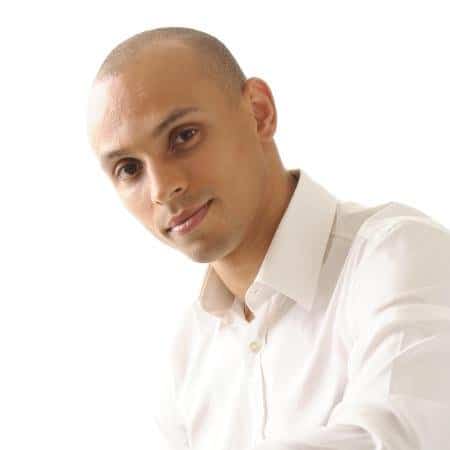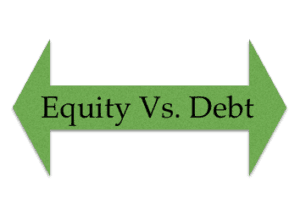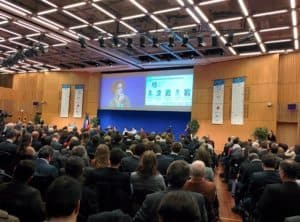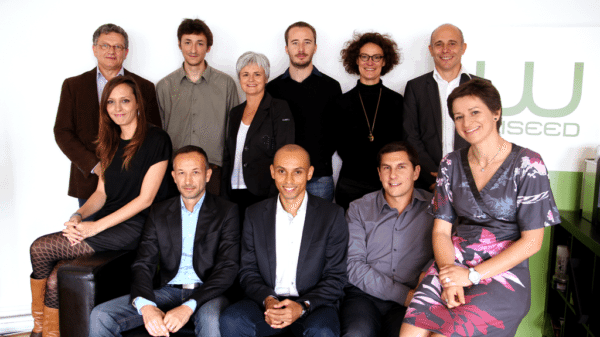Leading French crowdfunding platforms Anaxago and WiSeed launched real estate business units to meet strong demand from both real estate developers and investors. In this interview, Souleymane Galadima, the Managing Director of WiSeed Immobilier, presents his company’s current real estate crowdfunding model based on debt securities and lays out its development plans.
Founded in 2008, WiSeed pioneered equity crowdfunding with a mission: To democratize capital investment. Since then, its 40 000 members have invested over 15 million euros in more than 50 businesses. Last summer, WiSeed created quite a buzz by launching a crowdfunding campaign to buy a share of the international airport of the city of Toulouse.
 We met with Souleymane Galadima, the managing director of WiSeed Immobilier (WiSeed Real Estate).
We met with Souleymane Galadima, the managing director of WiSeed Immobilier (WiSeed Real Estate).
Therese: WiSeed pioneered equity crowdfunding. How did it get involved in real estate?
Souleymane: WiSeed pioneered equity crowdfunding not only in France but in the world. It started in 2008, at a time when there was not any competitor, and no regulation either. WiSeed’s co-founders Thierry Merquiol and Nicolas Sérès had a major influence on the crowdfunding regulation that was recently published in France.
WiSeed has led the way in real estate, too. We launched our first real estate crowdfunding campaigns as early as 2012. Two of these investments are already liquidated. They brought a 10% annual return to their investors.
These early real estate projects raised each less than 300 000 euros to finance the development of single family homes. The success of the campaigns was so strong that we decided to partner with the developer, called Lymo. We helped it set up its own crowdfunding platform and we took a stake in his company.
 Since then we have moved on to funding larger projects in residential as well as in commercial real estate. We also started co-investing with partners such as public and semi-public agencies in social housing and local government.
Since then we have moved on to funding larger projects in residential as well as in commercial real estate. We also started co-investing with partners such as public and semi-public agencies in social housing and local government.
The demand from our investors for real estate investment opportunities has not abated, on the contrary. Two months ago, we needed only 5 days to raise 1 million euros to finance a condominium of 51 apartment units near Paris. Yesterday, another property development project near the Swiss border was fully subscribed within 5 hours!
Therese: How did you integrate the real estate business into WiSeed?
Souleymane: In 2014 we set up a dedicated subsidiary, WiSeed Immobilier, which will be financed separately though a soon-to-be announced funding.
 The management team of this subsidiary comes from the finance and real estate sectors. Its president, Nicolas Sérès has in-depth experience in financial engineering. Véronique Guillemin, the head of the engagement committee in charge of vetting the projects is a seasoned real estate professional.
The management team of this subsidiary comes from the finance and real estate sectors. Its president, Nicolas Sérès has in-depth experience in financial engineering. Véronique Guillemin, the head of the engagement committee in charge of vetting the projects is a seasoned real estate professional.
The two business units, WiSeed Immobilier and WiSeed for startup investment share the same back-office but have different front-offices for sales relationships.
Therese: What are the benefits of real estate crowdfunding for your members?
Souleymane: The first benefit is simply to be able to invest in real estate development with as little as 1,000 euros. Crowdfunding technology makes it possible because it enables us to manage a multitude of small transactions and compliance processes while keeping the interface simple and smooth for investors.
 The second benefit is the ability for investors to understand the projects they invest in. Unlike SCPIs (the French equivalent of REITs) which are anonymous funds, crowdfunding enables investors to discover a project in detail, up to the DNA of its promoter, what makes him unique. Investing becomes more meaningful when investors can choose projects they want to support such as the construction of a child care facility or a commercial project that will bring jobs to their local community. As WiSeed, we are also watchful that projects respect certain values such as environmental-friendliness and social responsibility.
The second benefit is the ability for investors to understand the projects they invest in. Unlike SCPIs (the French equivalent of REITs) which are anonymous funds, crowdfunding enables investors to discover a project in detail, up to the DNA of its promoter, what makes him unique. Investing becomes more meaningful when investors can choose projects they want to support such as the construction of a child care facility or a commercial project that will bring jobs to their local community. As WiSeed, we are also watchful that projects respect certain values such as environmental-friendliness and social responsibility.
The next benefit is profitability…
Therese: Talking about return, WiSeed is an equity crowdfunding platform. Yet, WiSeed Immobilier proposes real estate financing though debt securities, why?
Souleymane: As we started with a blank slate, we preferred to gather experience before underwriting real estate equity offerings. For this reason we have decided to start with debt securities.
Debt-securities funding is reserved for development projects that are highly secured, such as projects that are mostly or entirely pre-sold or co-invested in by a social housing agency.
 Debt securities have a fixed rate, generally 9% or 10%, and a fixed term of 12 to 36 months. Upon maturity, investors receive principal and interests. Investors do not pay any fees, be they entry, management or exit fees. This is another major advantage of crowdfunding over real-estate funds that are riddled with fees.
Debt securities have a fixed rate, generally 9% or 10%, and a fixed term of 12 to 36 months. Upon maturity, investors receive principal and interests. Investors do not pay any fees, be they entry, management or exit fees. This is another major advantage of crowdfunding over real-estate funds that are riddled with fees.
From a taxation point of view, debt securities are fully taxable which means submitted to both income taxes and so-called social contributions.
The main benefit of these debt securities is their seniority over other form of debts. They must be reimbursed by the developer’s mother company in case of a problem at project level.
Therese: What are the risks and how can investors mitigate them?
Souleymane:Real estate development is a tough job that entails a number of risks. Developers can be held liable on their personal assets by their banks.
 Investors are protected from any such liability. However, their capital is at risk if the developer defaults completely. The numerous risk factors of property development are often underestimated by investors: sales can miss their targets; a crane can break down; a builder go out of business; a building permit deemed in theory irrevocable run into administrative disputes…
Investors are protected from any such liability. However, their capital is at risk if the developer defaults completely. The numerous risk factors of property development are often underestimated by investors: sales can miss their targets; a crane can break down; a builder go out of business; a building permit deemed in theory irrevocable run into administrative disputes…
Real estate crowdfunding helps investors understand these risks.
Most importantly, individual investors must realize that they are the ones who must take on the task of reducing their risk by diversifying their investment .This means that investors must review multiple projects before investing and put their money, let’s say 10 000 euros, into 10 different projects rather than one.
Therese: Who are WiSeed Immobilier’s active investors?
Souleymane: The common denominator of investors on WiSeed and WiSeed Immobilier is their low aversion to risk. They are between 35 and 45 year old and invest on average 3,000 euros. Only 11% are women.
In addition, WiSeed Immobilier attracts a new breed of investors, such as family offices, who have a greater investment capacity and follow more strictly financial investment strategies.
At this stage, the demand from investors exceeds the offer of projects presented on the platform. Yet, we continue to be very selective. We don’t want to disappoint investors. We know that most of them mistakenly view real estate as less risky than stocks. They therefore have a lower level of tolerance for failure than they would have for startup failure.
Therese: What are your plans for WiSeed Immobilier?
Souleymane: We want to accelerate our growth in this area. Since start, WiSeed has raised 15 million euros. In 2014, our members invested 6 million euros, including 25%, or 1.5 million euros in real estate projects. Our big goal for 2015 is to get to 20 million euros in real estate crowdfunding.
 Real estate crowdfunding offers huge opportunities. For example, real estate developers from large corporations can use it a marketing channel to increase the visibility of their projects. Crowdfunding can also be a means of engaging home buyers by letting them invest in the overall real estate project. In the same vein, public authorities could use crowdfunding to mend relationships within local communities by allowing inhabitants to invest and have their say in public projects.
Real estate crowdfunding offers huge opportunities. For example, real estate developers from large corporations can use it a marketing channel to increase the visibility of their projects. Crowdfunding can also be a means of engaging home buyers by letting them invest in the overall real estate project. In the same vein, public authorities could use crowdfunding to mend relationships within local communities by allowing inhabitants to invest and have their say in public projects.
We are also considering extending the scope of WiSeed Immobilier beyond real estate development, into property management and buy-to-(fix-and)-let, such as done in the US by Realty Mogul.
 International expansion is also part of our plans. We want to become a European crowdfunding leader able to compete with the largest US and UK competitors. Kickstarter’s recent talk about coming to France has created here a sense of urgency. As entrepreneurs, we would feel very sorry if most French projects were financed through US or UK platforms.
International expansion is also part of our plans. We want to become a European crowdfunding leader able to compete with the largest US and UK competitors. Kickstarter’s recent talk about coming to France has created here a sense of urgency. As entrepreneurs, we would feel very sorry if most French projects were financed through US or UK platforms.
Last but not least, we’re still working on our project to purchase a share of the city of Toulouse airport. Many have accused us of being in it only for the buzz. But we have collected 18 million euros worth of investment pledges from 8,000 people. This has convinced Toulouse’s Chamber of Commerce to co-invest in this project.
Thank you, Souleymane!
 Therese Torris is an entrepreneur and consultant in eFinance and eCommerce based in Paris. She has covered crowdfunding and P2P lending since the early days when Zopa was created in the United Kingdom. She was a director of research and consulting at Gartner Group Europe, Senior VP at Forrester Research and Content VP at Twenga. She publishes a French personal finance blog, Le Blog Finance Pratique and curates crowdfunding news on Scoop.It.
Therese Torris is an entrepreneur and consultant in eFinance and eCommerce based in Paris. She has covered crowdfunding and P2P lending since the early days when Zopa was created in the United Kingdom. She was a director of research and consulting at Gartner Group Europe, Senior VP at Forrester Research and Content VP at Twenga. She publishes a French personal finance blog, Le Blog Finance Pratique and curates crowdfunding news on Scoop.It.


